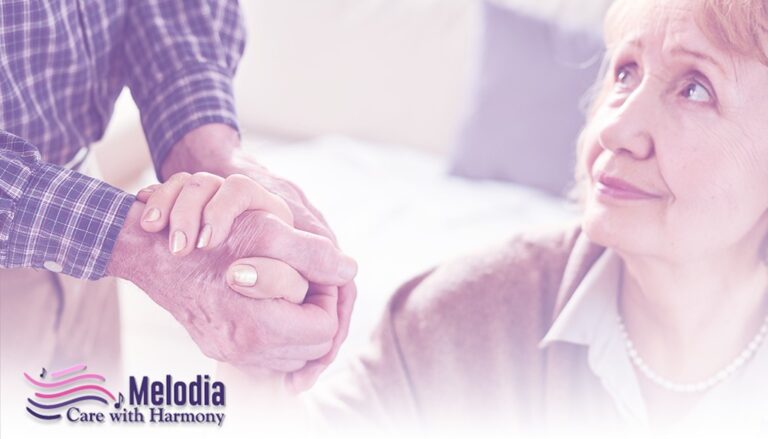Bereavement Support In Linden City, California
Grief does not have to be burdensome after the death of a loved one. Grief does not have to be a journey that you must walk alone. It can often be beneficial to have a safe, supportive environment in which to process the impact of the loss and find your path again.
Many people may not have family and friends who can offer care, support, and understanding through tough times, such as those following the death of a loved one. However, talking to someone else, such as a Melodia care hospice grief counselor or a member of a support group, can be beneficial at times.
Allow yourself time to grieve and, if necessary, take a break. You have the right to be sad.
Recognize that sorrow manifests differently in different people, so be conscious of how your mind, body, and emotions are reacting to your situation.
Speak to our doctor if you believe you are experiencing more grief than usual. They can help you with coping skills and referrals.
Melodia care Hospice take cares of the following points in the first few weeks after your loved one’s death:
We do not make you feel rushed or compelled to make a decision. There is no need to haste. We make the best choices for yourself, your family, your loved ones also considering your financial condition.
We do not make you feel obligated to do everything on your own. Solicit assistance from family, friends, and experts are provided to you.
Above all, we take care of you to make sure that you’re resting, eating, taking care of yourself, and looking after your emotional wellness.
The death of a loved one can be profoundly upsetting at any time. A bereavement during a Corona-virus outbreak is likely to be considerably more difficult. You may have had the restriction to see your loved ones that often. Because of the social isolation, the manner you usually grieve or seek comfort from friends, family, and colleagues may have changed.
But Melodia care hospice make sure that you will not be alone in this situation and because of the epidemic, you would not be put in any more difficulty also that your loved one receive the funeral arrangements that you would have preferred.
We find methods to memorialize your loved one wherever possible, with those closest to you. If you cannot make to the funeral, we arrange a time to connect electronically via phone or video conference. You might want to meet remotely to say a prayer, read a poem that expresses how you feel, or share memories of the individual. If that isn’t possible, you can listen to a special piece of music or compose a letter to mark the end of your relationship. Once the Corona-virus outbreak is gone, a memorial ceremony can also be re-arranged.
You can always share your feelings with your family and friends. If you don’t have somebody to talk to, there are our counselor that will help you through this difficult period. It may be beneficial to speak with the deceased. It can be reassuring to have a picture or an object that makes you feel closer to them.
Services Of Hospice Bereavement Support

- Counseling for individuals and families
- Support through phone and/or mail
- Observances of Remembrance
- Children and teenagers receive specialized assistance.
- Debriefing and stress management following a critical occurrence
- Presentations about bereavement in the community
- Video conferencing facilitated virtual grief support groups.
Because mourning can begin before death, pre-loss counseling is recommended.
Bereavement care includes phone calls, visits, written materials, support groups, and individual treatment sessions. You have control over how and when you receive care.
What Is Anticipatory Grief?

Anticipatory grief is the sadness experienced prior to death of your loved ones. Everyone has a unique experience. Although not everyone experiences anticipatory grieving, for some, it might be more agonizing than grief experienced after death.
Anticipatory grief is also known as silent grief. Tradition teaches us that mourning comes only after loss. There is no set period of time when mourning begins or ends. There is also no correct or incorrect way to feel or act. Whatever your path may be, our hospice team is here to help.
Caregivers and patients may experience grieving emotions to a death that has not yet occurred. These are natural reactions to loss, and they may help you prepare for the emotional depth of mourning after the death.
Anticipatory sadness manifests itself in a variety of ways, the most common of which are anxieties about current or potential losses. These may include concerns about:
- Experiencing life without a loved one
- Family structure breakdown
- A new journey travelling a path not familiar with.
- You’re losing your social life.
- Loss of friendship
- Independence is fading
- Loss of control
Melodia care hospice provides confidential grief support groups on themes such as grieving, mourning, goal setting, coping strategies, reconciliation, and resolution, among others. Grief support groups provided a secure environment for you to share your emotions with others who are going through a tough situation. These Melodia care grief support groups can be held virtually during the COVID-19 pandemic.
We always have professionals available to speak about grief and coping with the death of a loved one at your workplace, school, church, club, or other community organization. Remembrance services provide an opportunity to remember and commemorate loved ones who have passed.
Stages Of grief

People tends to think that grief has only five stages that is denial, anger, bargaining, depression and acceptance but that is not true.
There is much more to mourning than the five stages. It could be a loss of faith, a loss of direction, or a loss of identity. It needs more than traditional therapy in these complex instances. It takes time to create trust and relationships that begin to break down the walls.
Grief is a natural response to loss that can influence all aspect of our life physically, mentally, emotionally, and socially. Anger, guilt, and anxiety are all common grief reactions, as are changes in diet or behavior.
It’s best not to conceive about mourning as a progression. Consider the grieving process to be a roller coaster ride, with ups and downs, highs and lows. Understanding what is “normal” in sorrow allows us to know that others have been through this and found healing.
Typical reactions include:
- stumped, nausea, and shortness of breath are all physical symptoms.
- Sleep and appetite disorders, sobbing, and social seclusion are all behaviors.
- Sadness, loneliness, increased irritation, guilt, anxiety, and relief are all feelings.
- Disbelief, bewilderment, and compulsive thoughts about the deceased
- Spiritual reactions include either embracing religious rites or questioning one’s faith.
What Is Bereavement Support Group?

The objective of the support group is to allow you to connect with others who have suffered similar losses and challenges. The group is led by experienced Melodia hospice care bereavement support workers who have received group work training. We’ve discovered that group members occasionally come to know each other well, and that some continue to meet informally after the sessions are over.
One-on-one bereavement counseling can be provided over the phone, via email, or in person. It might be an opportunity to speak openly about the effects of your loss with someone who will be able to listen to your mourning experience. Support is person-centered and non-directive, and it can assist you in thinking through any changes you may need to make and finding a new path to a new life.
Every loss is a unique experience, and no two people experience it in the same way. Many people find that talking with someone who is not a member of their family or close circle of friends is beneficial.
Melodia care hospice collaborate closely with parents and caregivers to support children who are grieving. As parents and caregivers, you may be in the best position to assist children. We can supply you with resources, information, and services to assist you in managing this.
We hold confidential meetings that last no more than an hour and are scheduled at a mutually convenient time. The sessions are held in an environment that allows participants to process their thoughts and feelings at their own pace.
Bereavement Support Counseling

Counseling provides you with good hold, set aside specifically to examine the questions and problems that have brought you to this point, as well as the concerns that are important to you. Grief is likely to touch many aspects of your life, and you will be challenged to explore this. Your counsellor will not give you advise or tell you what to do. Instead, you will be helped in defining your emotions, situation, and the various solutions available to you. You will control what is discussed at your meetings; you will remain ‘in charge.’
Counseling may entail addressing life events from the present, recent, or distant past, and how they may have shaped your current circumstances. It may entail analyzing your emotions, relationships, and thought and behavior patterns. It may entail becoming more aware of the external circumstances in your life that are influencing you. Your counselor’s goal is to listen to you respectfully, fully, and actively; to respond to you in order to help you explore everything you chose to share; and to identify the way forward with you either to find answers to or decisions to the difficulties, or to discover ways of accommodating them that are satisfactory for you.
Melodia care Hospice grief professionals are key in increasing awareness and taking action in the area of bereavement. Hospice bereavement programs address the grieving and loss needs of hospice patients and their families, as well as the grief and loss need of staff and volunteers, as well as community-wide grief and loss needs.
Melodia care Hospice bereavement practitioners function as effective community champions by developing grief awareness and drawing attention to the community’s grieving population’s needs. Melodia care Hospice bereavement specialists may also push for additional grieving and loss education and research, as well as the most effective strategies for assisting individuals in coping in a healthy way. Counseling for bereavement will help you get through this difficult time.
If your family is religious, you may have your own explanation for what happens after death. You might wish to seek counsel from a religious leader in your community on how to aid your children.
Unless your family has a religious religion in which everyone is comfortable, telling a small child that he or she has gone to heaven or to live with God may be confusing.
Counseling sessions can help those who are grieving by validating their feelings and providing a secure, nonjudgmental space for them to express themselves entirely. If a group of family members or couples wish to learn how to help one their children more effectively, they can attend counseling sessions together. A bereavement counsellor discusses the grieving process as well as how to begin a new, healthy relationship with a dying loved one.
You can reach us at any time by contacting us through our 24/7 online customer support chat or by calling 1-888 635-6347 (MELODI-7) Melodia Care Hospice.



